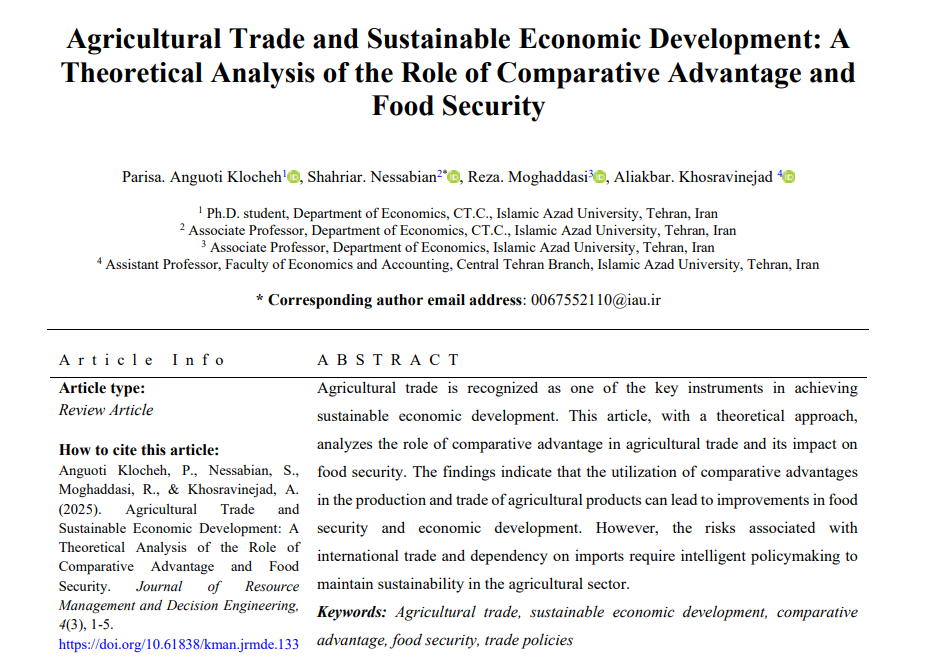Agricultural Trade and Sustainable Economic Development: A Theoretical Analysis of the Role of Comparative Advantage and Food Security
Keywords:
Agricultural trade, sustainable economic development, comparative advantage, food security, trade policiesAbstract
Agricultural trade is recognized as one of the key instruments in achieving sustainable economic development. This article, with a theoretical approach, analyzes the role of comparative advantage in agricultural trade and its impact on food security. The findings indicate that the utilization of comparative advantages in the production and trade of agricultural products can lead to improvements in food security and economic development. However, the risks associated with international trade and dependency on imports require intelligent policymaking to maintain sustainability in the agricultural sector.
References
Anderson, K. (2010). The Political Economy of Agricultural Price Distortions. Cambridge University Press. https://doi.org/10.1017/CBO9780511778964
Balassa, B. (1965). Trade liberalisation and "revealed" comparative advantage. The Manchester School, 33(2), 99-123. https://doi.org/10.1111/j.1467-9957.1965.tb00050.x
Barrett, C. B. (2008). Smallholder market participation: Concepts and evidence from eastern and southern Africa. Food Policy, 33(4), 299-317. https://doi.org/10.1016/j.foodpol.2007.10.005
Binyaz, A., & Mohammadi, H. (2018). The impact of trade openness in the agricultural sector on food security in Iran (An autoregressive distributed lag approach). Quarterly Journal of Agricultural Economics Research, 10(2), 81-104. https://jae.marvdasht.iau.ir/article_2833.html?lang=en
Ebrahimi Khosfi, Z., Ebrahimi Khosfi, M., Vali, A., & Rezaei, A. (2013). Consequences of climate change on agriculture and food security Proceedings of the First International Conference on Landscape Ecology, https://elmnet.ir/doc/20160202-83248
Fang, L., & Wang, Y. (2025). Research on Influencing Factors of Agricultural Supply Chain Resilience. 1. https://doi.org/10.63313/economics.8001
Fao. (2021). The State of Agricultural Commodity Markets 2020. https://www.fao.org/interactive/state-of-agricultural-commodity-markets/2020/en/
Frankenberg, E., & Thomas, D. (2019). Human capital and shocks: Evidence on education, health, and nutrition. In C. B. Barrett, M. R. Carter, & J. P. Chavas (Eds.), The economics of poverty traps (pp. 23-56). National Bureau of Economic Research. https://doi.org/10.7208/chicago/9780226574448.003.0001
Headey, D., & Ecker, O. (2013). Rethinking the measurement of food security: From first principles to best practice. Food Security, 5(3), 327-343. https://doi.org/10.1007/s12571-013-0253-0
Jahansouri, M., & Farahani, H. (2017). The role of sustainable agriculture in ensuring food security among rural households Proceedings of the 4th International Conference on Geographical Sciences, https://en.civilica.com/doc/656329/
Krugman, P. R., & Obstfeld, M. (2018). International Economics: Theory and Policy (10th ed.). Pearson. https://books.google.com/books/about/International_Economics.html?id=Ej17oAEACAAJ
Lu, J. (2025). Influencing Factors of Agricultural Supply Chain Resilience Based on ISM-MICMAC. International Journal of High Speed Electronics and Systems. https://doi.org/10.1142/s0129156425405042
Masters, W. A., & Winter Nelson, A. (1995). Measuring the comparative advantage of agricultural activities: Domestic Resource Costs and the Social Cost Benefit Ratio. American Journal of Agricultural Economics, 77(2), 243-250. https://doi.org/10.2307/1243534
Negi, D. S., & Ramaswami, B. (2019). International risk sharing for food staples International Agricultural Trade Research Consortium Symposium, Seville.
Pingali, P. (2012). Green Revolution: Impacts, limits, and the path ahead. Proceedings of the National Academy of Sciences, 109(31), 12302-12308. https://doi.org/10.1073/pnas.0912953109
Pretty, J., Toulmin, C., & Williams, S. (2011). Sustainable intensification in African agriculture. International Journal of Agricultural Sustainability, 9(1), 5-24. https://doi.org/10.3763/ijas.2010.0583
Swinnen, J., & Kuijpers, R. (2019). Value chain innovations for technology transfer in developing and emerging economies: Conceptual issues, typology, and policy implications. Food Policy, 83, 28-38. https://doi.org/10.1016/j.foodpol.2017.07.013
World, B. (2020). World Development Report 2020: Trading for Development in the Age of Global Value Chains. https://www.worldbank.org/en/publication/wdr2020
Zarei, A., & Izadi, F. (2024). Developing Green Human Resource Management with a Gap Analysis Approach (Case Study: Agricultural and Natural Resources Research and Education Center of Fars Province). First National Congress on Sustainable Development and Social Responsibility: Challenges and Solutions. https://civilica.com/doc/217012

Downloads
Published
Submitted
Revised
Accepted
Issue
Section
License
Copyright (c) 2025 Parisa Anguoti Klocheh (Author); Shahriar Nessabian; Reza Moghaddasi, Aliakbar Khosravinejad (Author)

This work is licensed under a Creative Commons Attribution-NonCommercial 4.0 International License.









